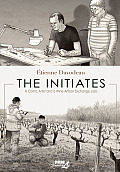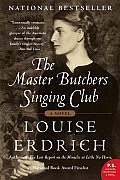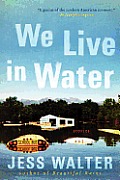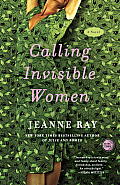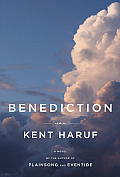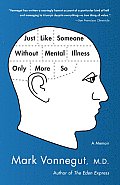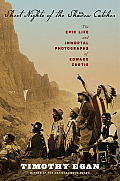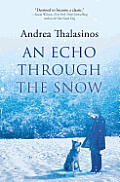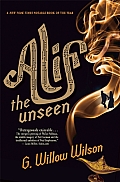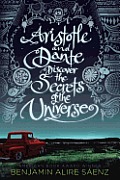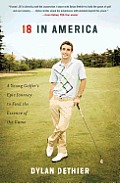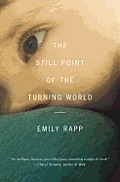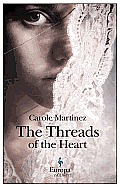Link to this review in the form of a comic strip by geneambaum tagged nonfiction • graphic novel • art • science
Link to this review by darcy tagged literary • historical fiction
This novel about Argus, North Dakota, and its residents, spans the end of the first world war and the aftermath of the second. After surviving WWI, Fidelis marries Eva, the pregnant widow of his friend who was killed in action. They move to Argus from Germany, and Fidelis works there as a butcher. Delphine Watzka, daughter of the town’s drunk, and her balancing act partner, Cyprian, return to Argus where her father is a suspect in the murder of a family. Delphine stays to watch over him. She meets Fidelis when she starts to work for Eva at the service counter of their butcher shop.
Why I picked it up: I love Louise Erdrich’s other books, and I’d never heard of this one. Also, I’m a vegetarian, but for some reason I’m drawn to books with words like “butcher” in the title.
Why I finished it: Fidelis and Cyprian fought for opposing sides in World War I. Now they must coexist in a small town, and they compete for the affections of Delphine. It’s an odd love triangle because Cyprian and Delphine are performing partners, and only pretend to live as husband and wife to keep the gossip at bay. Other characters in the story include the creepy sheriff who is stalking the town’s female mortician, and Step-and-a-half, the town’s wandering woman who earns her living selling rags and cast off items. These characters are all unique and flawed, but their stories are so deeply intertwined I stayed up late into the night to unravel the relationships.
Throughout all of this is the group of men who come together in the evenings to sing, despite their differences and business disputes during the day.
I’d give it to: Meredith, who sings in her own group, like the Master Butchers, as a way to keep folk music alive. Though there is no written sheet music in the book, there are plenty of beautiful song lyrics in German, with English translations.
Link to this review by darcy tagged literary • short stories
A collection of short stories that cover all sides of humanity, from a homeless man begging for money in order to buy the newest Harry Potter book to a father trying to catch the thief who is stealing from the family vacation fund.
Why I picked it up: I’ve been busy lately but I must feed my fiction addiction. A collection of short stories seemed like just the thing. And I love Jess Walter’s novels, so I knew these would be a perfect fit.
Why I finished it: Walter describes my hometown of Spokane so well I almost feel homesick for the stink of diesel exhaust on Sprague Avenue. In the story “Statistical Abstract for My Home of Spokane, Washington” he tells a story in the format of a statistical abstract with facts about the city, like population and number of citizens below the poverty line. In between those lines he weaves the story of his own history in Spokane with observations that residents of Spokane can connect to such as the number of adult men riding BMX bikes through the streets. (I always wondered about that when I lived there.)
The characters in these stories feel real. I especially love the homeless man who is holding up a sign for money to be used to buy his son the new Harry Potter book. I feel like I’ve seen all of these characters on a bus, stood in line next to them at the store, and helped them in the library.
I’d give it to: Anthony, who would love the story “Wheelbarrow Kings,” about the guys who lug a giant TV to a pawn shop with a stolen wheelbarrow. Anthony managed a pawn shop for years and always shared stories about people who tried to get cash for their aging electronics or children’s DVDs for beer money.
Link to this review by emilyreads tagged literary
One morning Clover Hobart wakes up to find herself invisible. The worst part is that almost no one notices: not her overworked husband, not her boomerang/jobless son, not the distracted young nurse at her doctor’s office. But her best friend Gilda notices, and soon Clover discovers a whole network of invisible women offering each other support and the promise of a cure — if they can get the male honchos of a large pharma company to admit their popular drug combination is causing the problem.
A blend of Norma Rae-style empowerment and Jennifer Weiner-esque humor, Ray’s novel succinctly and memorably captures the frustrations and freedoms of women past a certain age.
Why I picked it up: I’ve loved Jeanne Ray’s other books, including Julie and Romeo and Step Ball Change. Plus, she didn’t write her first book until age sixty, which kind of makes her my hero.
Why I finished it: Clover’s (and Ray’s) matter-of-fact, no-whining voice made me root for her, to the point that I couldn’t decide whether she’d be better off remaining invisible or not. The secondary characters — best friend Gilda; Vlad, Clover’s daughter’s boyfriend; his invisible mother, Ariana; and Clover’s hapless, clueless husband, Arthur — were just as delightful and surprising.
I’d give it to: My friend Ellen, who would get a kick out of the unanticipated freedoms of invisible life. (No more clothes! No more hot flashes or sudden chills! The ability to take a gun out of a bank robber’s hand without fear!)
Link to this review by emilyreads tagged literary
Lewis is dying, and it’s time to put his affairs in order. That means ensuring his wife, Mary, doesn’t overdo it taking care of him; convincing his daughter, Lorraine, to return from the big city to run the hardware store; and coming to terms with his failed relationship with his son, Frank, who fled Holt as a teenager after being bullied for his homosexuality. Over the course of a long, hot summer, Lewis, in hospice care at home, watches the comings and goings of his neighbors and friends and relives painful moments in his life.
Why I picked it up: Haruf’s earlier novel, Plainsong, was the first selection for our town’s annual everybody-read-the-same-book event many years ago. He’s on my go-to list of adult authors now.
Why I finished it: Despite the failures of each of the characters — unkindness, affairs, fear masquerading as hatred, provincialism — the novel is ultimately hopeful. Moments of crazy vitality (elderly women skinny dipping in a cattle tank!) add surprise and depth to the story.
I’d give it to: My dad. The succinct, Midwestern way the characters speak, think, and act reminds me of him, and of what little I know about his dad.
Link to this review by silver tagged biography
Mark is Kurt Vonnegut’s oldest son, a hardworking, shy, nervous and smart kid. He grew up in a big house in Cape Cod with two sisters. They were poor (his father got famous later), and their parents mostly left them alone. After high school he helped start a self-sustaining commune in British Columbia. There Mark had his first schizophrenic episode when he was living in the commune. He was treated, but it wasn’t long before he had a second episode. Kurt had to bring Mark home for treatment.
Mark applied to more than twenty medical schools and got rejected by all except Harvard. He started working extended hours, and his habit became to drink a little bit of alcohol every night with his Xanax. After he became a doctor this eventually pushed him over the edge. After another episode (his fifth), he was admitted to the psych unit at the hospital where he worked as a pediatrician.
He still works as a doctor and still hears voices. He has conversations with Dostoyevsky, van Gogh, Beethoven, and Abraham Lincoln, but now he knows not to share the whole truth with people around him.
Why I picked it up: The first book Gene ever recommended to me was Cat’s Cradle, back when we were still living in Korea. He said it was very funny. After reading about thirty pages, I didn’t get it. I wasn’t sure if he was messing with me or not. Many of my friends LOVED the book. I felt very stupid, and I still feel dumb whenever Kurt Vonnegut’s books are the topic. So I hoped, at least, that by reading this I could understand his son.
Why I finished it: I’ve been thinking a lot about studying psychology in school or on my own. I’m a physical therapist, and t fascinates me that people’s psychological problems manifest in physical problems. Many times I feel stuck because I don’t know how to help them. Mark is a very good clinician who is caring, passionate, and experienced. He is also a patient himself. That he pulled himself out of the dark hole of his own mental illness through treatment is amazing.
Here and there he also tells stories about his dad, whom he usually refers to as “Kurt.” Now I am more interested in reading Kurt’s books.
I’d give it to: Kathryn. She is very interested in arts, both creating and appreciating them. Mark Vonnegut’s art in the book would make her happy, particularly the picture “Flowers and Fish, 2003,” which has a Van Gogh feel and great energy. (I also really liked his self portrait, but it made me feel a bit sad because he looks lonely.)
Link to this review by flemtastic tagged history • biography • art
Edward Curtis picked up a camera on a lark after a logging accident left him weak and bedridden for a year. Within a decade he was a famous portraitist in Seattle where he photographed Princess Angeline (the last surviving relative of Chief Sealth) and wealthy Seattleites. An avid outdoorsman, he toted a camera and glass plates up and down Mount Rainier to complete one of his first lauded projects, exhibiting the drive and energy that would carry him through the biggest project of his life, The North American Indian. Curtis visited and lived with native tribes across the country to document native cultures that were rapidly disappearing.
Why I picked it up: Egan’s The Worst Hard Time and The Big Burn were thoroughly researched and filled with historical figures that his writing brings completely to life. I will read anything Egan writes, about any topic — he is a literary slam dunk for me.
Why I finished it: Edward Curtis was a stereotypical, compulsive genius. He drove himself for over thirty years to complete the project (ultimately published as a massive, twenty-volume set of books now highly sought after by collectors). Conservative estimates say he worked sixteen-hours days, seven days a week for the three decades it took to complete. (In addition to photographs, Curtis also recorded over 10,000 songs along with a few dances on film, and wrote extensively.) His compulsion caused his divorce, ruined his finances, and the wrecked his health. Curtis was never a desk man who merely organized teams of ethnographers — he did it all himself, living with tribes for months on end, participating in their ceremonies, and earning their trust. As his career and fame grew, Curtis became a more and more vocal defender of native cultures, as well as a decrier of the U.S. government treatment of Native Americans.
I’d give it to: My parents, Beth and Jack. My dad would like that Curtis was a self-made man who became a friend to (and portraitist of) Theodore Roosevelt. My mom would like watching the train wreck of Curtis’s life — his drive to complete the project cost him everything, and he died forgotten by all but a few academics (though he enjoyed a resurgence of popularity and academic approval decades later).
Link to this review by darcy tagged literary • historical fiction
Two stories are told by women in different cultures and time periods who are linked by a line of Siberian Husky sled dogs.
In 1919 Siberia, the Red Army is chasing away native people and destroying their culture. The dogs, also called the Guardians, are the livelihood of the Chukchi. Jeaantaa defies the spiritual beliefs and traditions of her people, and sends the dogs away with a white man named Robert Ramsey, who flees with them across the Bering Sea to Nome to protect them. (The Soviets are out to destroy the Chukchi way of life, including their dependence on dogs.)
Decades later and hundreds of miles away, Rosalie, a young woman from a reservation in Wisconsin, is trying to keep a steady job and do something with her life. After leaving work one night she spies a Husky in a junk yard, chained up, miserable, and scrawny. She feels a kinship with the dog, steals him, and names him Smokey. She flees her abusive relationship and moves back home. She and Smokey both need time to heal, but soon Rosalie finds a job in a local kennel as the sled dog handler.
Why I picked it up: Since my first trip to Alaska I’ve been mesmerized by sled dogs.
Why I finished it: I loved the simultaneous stories — the chapters switch back and forth in place and time to tell both. Thalasinos also captured dog personalities and behaviors so well I couldn’t put it down. Rosalie became stronger both physically and emotionally as she learned to work with the dogs, especially a rescued lead dog named King. And the moments on the sled are described so well I felt like I was driving my own team.
I’d give it to: Gayle. Although this book talked more about the Bear Grease race, it also mentioned the Iditarod. Gayle took me to my first Iditarod start in Alaska, and it will be her fault if I sell my house to move and open a racing kennel in Alaska.
Link to this review by wally tagged fantasy • literary
Alif, a gray hat computer hacker living in the Middle East, has fallen in love with the wrong woman, Intisar. She is betrothed to the head of security, the Hand, who will stop at nothing to imprison or even kill Alif. When Intisar gives Alif the jinns’ sacred book for safekeeping, the 1001 Days, Alif and his friend Dina must flee the city and hope that Vikram, a real jinn, will help them find safety.
Why I picked it up: This book came out right around the time of the Arab Spring and got a lot of press. Its promised otherworldly spin on freedom and fate drew me in. Jacket blurbs by Gregory Maguire, Holly Black, and Neil Gaiman also convinced me I had to read this.
Why I finished it: The writing is superb and flows lyrically from one sentence evoking the harsh desert climate to the next about twenty-first century culture clashes. I enjoyed Alif’s change from an overgrown, petulant rebel boy into a thoughtful, caring man, as well as the development of his devout friend, Dina, as she and Alif must rely on each other. Also, Wilson’s perspective on Islam (she’s a convert), Islamic culture, and the politics of the Middle East fascinated me.
I’d give it to: Senait, who would enjoy the story of the immature Alif who must rely on truly unseen forces and deepen his understanding of women to win his freedom and find true love.
Link to this review by dawnrutherford tagged literary • coming of age
Ari is a good kid, but a bit of a loner. His dad is a Vietnam vet who never talks about his horrific experiences during the war. No one talks about Ari’s older brother, who is in prison for murder, and Ari can barely remember him. And then one summer Ari meets Dante, who is in many way his opposite — effusive, emotional, and detached from his Mexican heritage. Dante teaches Ari to swim, and a friendship is born that changes both boys’ lives.
Why I picked it up: This is another Printz honor book I missed reading the year it came out, and I was drawn to this one’s poetic title and beautiful cover.
Why I finished it: I can’t remember the last time I read a book, if ever, that captured the inner life of a teenage guy with such sensitivity and tenderness. Ari and his family gradually open up and face deep, emotional secrets thanks to Dante’s impact on their lives. Reading this book made me feel both vulnerable and strengthened. When Dante first tells Ari he is gay, Ari is concerned for his friend, as their small town in Texas is very conservative. But it is Ari who is put through the emotional wringer, worrying about his friend, confused by his openness and his willingness to experiment sexually with both genders and with drugs. His concern for Dante and his own parents isolates him, but watching him grow and find support gave me renewed faith in the world.
I’d give it to: Ken, who would love Ari’s escapes into the desert to look at the stars, be alone with his thoughts, and push the boundaries his folks set for him.
Link to this review by flemtastic tagged biography • coming of age
Free-spirited seventeen-year-old Dylan Dethier decided to take a year off between high school and college to play eighteen holes in each of the forty-eight contiguous states. It began as a low-budget trip, with Dylan crashing with friends of friends or sleeping in the back of his packed Subaru wagon clutching a small hatchet. (He was freaked out after someone tried to break into his car one night while he was in it.) He played when it was snowing and during windstorms because it would have thrown off his schedule if he didn’t. Dylan’s playing partners told others about his trip, he did a few press appearances, and nation-wide interest grew. Premier courses all around the country invited him to play for free.
Why I picked it up: I am a golf coach and a dedicated player. Taking a year off probably isn’t in the cards for me, so I had to live vicariously through Dethier.
Why I finished it: I couldn’t believe his parents let him go on this yearlong trip at seventeen! Dylan was a very plucky traveler, though; after he spent a night on a mountain pass in the Badlands, he had to chip ice off the inside of his windshield while wearing every article of clothing he had brought. Some mornings he strolled into a motel like he had rented a room and ate huge, free breakfasts! My favorite incident was probably the time he met an older man at a range in Las Vegas who could barely hit the ball. Dylan agreed to a friendly match for cash, which he really needed. But at the third hole his opponent morphed into a great player, and soon Dylan was into him for hundreds of dollars.
I’d give it to: Brian, a student on my golf team, who has passion to play five to six days a week, even in the winter here in the Pacific Northwest! I could see Brian taking this trip, and he would love that Dylan got to play with pro golfer Phil Mickelson and meet the PGA commissioner.
Link to this review by emilyreads tagged nonfiction • biography
At nine months old, author Emily Rapp’s son Ronan was diagnosed with Tay-Sachs disease, a rare and always fatal genetic illness that would halt his developmental age at six months and eventually lead to seizures, blindness, and death. Stunned by the diagnosis — both she and her husband had been tested — Rapp responds in the only ways she knows how: she rages, she weeps, she bargains, she screams, and she writes.
She focuses on the ways she and other “dragon mothers” of terminally ill children deal with unimaginable loss and on the ways they must navigate others’ reactions, choosing their words carefully and steeling themselves against well-intentioned but ultimately stupid comments or platitudes. Rapp dissects her own grief, using snippets of poems and writings to identify, catalog, name, and remember the fury, guilt, impatience, and reverence she felt during the long months between Ronan’s diagnosis and death.
Why I picked it up: Good reviews and blurbs by authors I admire (Cheryl Strayed, Elizabeth McCracken) made me set aside my initial “why would I read about dying babies” mentality and give it a shot.
Why I finished it: Oddly enough, knowing that there was no hope for Ronan’s survival made it easier to stay connected to Rapp’s story: I wasn’t on pins and needles hoping for a last-minute miracle cure. Rapp’s meditations on the meaning and purpose of life, drawing from a multitude of traditions and personal experiences, are challenging and thought-provoking.
I’d give it to: My friend Sarah, widow of my high-school boyfriend, who knows better than most what it’s like to face unexpected, life-changing events and emerge from the crucible a different person. She’d appreciate Rapp’s unguarded emotions — sorrow, yes, but also anger and bitterness — and the graceful, lyrical way Rapp discusses the inexpressible.
Link to this review by davidtomashek tagged literary
Each of the girls in Frasquita’s family gets a gift when she becomes a woman. It comes in a box and must mature for nine months before being opened. Frasquita’s gift is a sewing kit with reels of colorful thread — after receiving them she has supernatural powers with her needle. One of her first projects is to embroider a beating heart for the Virgin Mary statue in church. But her powers bring her little happiness, and she is viewed with suspicion by the people of her nineteenth century Spanish town. Frasquita puts all her energy into her arranged marriage, which is not easy; her husband José goes mad and believes he is a chicken for a year. Even after his cure, José is obsessed with a fighting rooster, and loses all their money by betting on it. Finally he wagers (and loses) the last thing he can offer: his wife’s honor. Once she fulfills the winner’s lust, she packs up her children and walks out of town, never to return. This begins a new journey that takes her and her children across the sea.
Why I picked it up: This book was recommended by Rachael Berkey on her vlog, Drinks With Rachael. Between sips of her gin and tonic she said that this was a “fabulous book to lose yourself in on your commute.”
Why I finished it: The characters do not interact so much as collide with one another. Frasquita fights with her mother, who wants to open the box before the nine months are up. Her mother obsessively digs holes all over town, trying to find where Frasquita hid it. Soon the whole town is digging holes, convinced that the old woman knows about a buried treasure. Each character has a similar madness or obsession that immediately creates a chain reaction through everyone around.
I’d give it to: Norma, who appreciates the power of storytelling. One of Frasquita’s daughters is mute until she opens her box and finds her voice. From then on she is an artist of oral tradition, forever disdaining the written word. “And her hands. Have I ever told you about her hands? The hands of storytellers are flowers waving in the warm wind of dream…”
